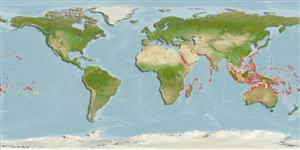Environment: milieu / climate zone / depth range / distribution range
Ökologie
seewasser riff-verbunden; tiefenbereich 5 - 30 m (Ref. 9823). Tropical; 30°N - 28°S
Indo-Pacific: Red Sea to the Tuamoto Islands, north to Ryukyu Islands, south to Rapa.
Size / Gewicht / Alter
Maturity: Lm ? range ? - ? cm
Max length : 18.0 cm TL Männchen/unbestimmt; (Ref. 30573)
Rückenflossenstacheln (insgesamt) : 9; Rückenflossenweichstrahlen (insgesamt) : 12; Afterflossenstacheln: 3; Afterflossenweichstrahlen: 11 - 13. Body brown, shading to yellow on abdomen, thorax and lower head, and to reddish posteriorly; reddish lips; posterior of operculum with a large black spot, a green spot above and adjacent to this, and above this is a red spot. Pectoral base with a dark brown bar. Dorsal spines pungent.
Adults occur in clear lagoon and seaward reefs from the lower surge zone to a depth of 30 m (Ref. 1602). Usually in areas with mixed rubble, coral, or rock and sand (Ref. 9710). Usually solitary among large corals. Small juveniles swim with their head down, keeping dorsal and anal fins erected, and may seem like the face of a larger fish when viewed from side on by a predator (Ref. 48636). Oviparous, distinct pairing during breeding (Ref. 205). Occasionally seen in fish markets and aquarium trade.
Life cycle and mating behavior
Maturities | Fortpflanzung | Spawnings | Egg(s) | Fecundities | Larven
Oviparous, distinct pairing during breeding (Ref. 205).
Westneat, M.W., 2001. Labridae. Wrasses, hogfishes, razorfishes, corises, tuskfishes. p. 3381-3467. In K.E. Carpenter and V. Niem (eds.) FAO species identification guide for fishery purposes. The living marine resources of the Western Central Pacific. Vol. 6. Bony fishes part 4 (Labridae to Latimeriidae), estuarine crocodiles. FAO, Rome. (Ref. 9823)
IUCN Rote Liste Status (Ref. 130435)
Bedrohung für Menschen
Harmless
Nutzung durch Menschen
Fischereien: weniger kommerziell; Aquarium: Kommerziell
Tools
Zusatzinformationen
Download XML
Internet Quellen
Estimates based on models
Preferred temperature (Ref.
123201): 24.9 - 29.3, mean 28.2 °C (based on 2766 cells).
Phylogenetic diversity index (Ref.
82804): PD
50 = 0.5002 [Uniqueness, from 0.5 = low to 2.0 = high].
Bayesian length-weight: a=0.00977 (0.00470 - 0.02030), b=3.07 (2.89 - 3.25), in cm total length, based on LWR estimates for this (Sub)family-body shape (Ref.
93245).
Trophic level (Ref.
69278): 3.5 ±0.37 se; based on food items.
Widerstandsfähigkeit (Ref.
120179): hoch, Verdopplung der Population dauert weniger als 15 Monate. (Preliminary K or Fecundity.).
Fishing Vulnerability (Ref.
59153): Low vulnerability (10 of 100).
Nutrients (Ref.
124155): Calcium = 76.6 [46.0, 126.8] mg/100g; Iron = 0.683 [0.402, 1.246] mg/100g; Protein = 18.5 [15.6, 20.7] %; Omega3 = 0.153 [0.101, 0.236] g/100g; Selenium = 23.8 [14.6, 42.4] μg/100g; VitaminA = 138 [43, 498] μg/100g; Zinc = 1.61 [1.12, 2.51] mg/100g (wet weight);
